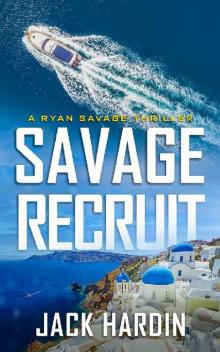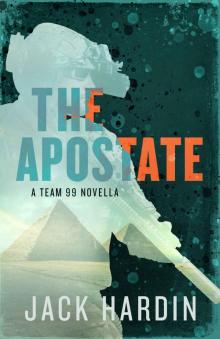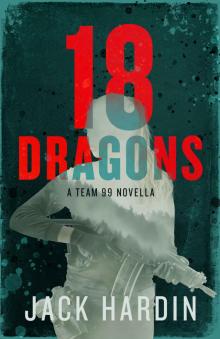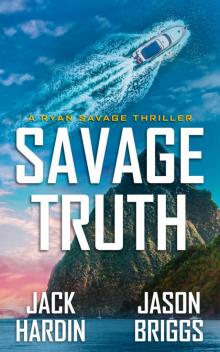- Home
- Jack Hardin
Lonely Coast Page 9
Lonely Coast Read online
Page 9
“So who’s going after Pavel?” someone along the wall asked.
“Headquarters has designated O’Conner and Fiske.”
Ellie felt a powerful sense of relief and gratitude at hearing her name on the roster. In some merciful way, she was being allowed a chance for redemption. She had failed to get Pavel the first time, and now her country was suffering as a result. She hadn’t realized until now that she had been nervously picking at her fingers while Phil was talking.
Parnell raised his brows and appeared a little disappointed. He looked to the two female agents across the table from him. “Well, if you two end up chasing him to Cancun or Cozumel and need a break, let me know.”
Addressing members of the support team, Phil said, “I’ll be assigning a few of you to work with our agents while they’re in Mexico. And to everyone in here, you did one hell of a push these last two days. I’m proud to have each one of you on this ship.” With that, he dismissed the room, requesting that Ellie and Hailey remain behind.
Hailey looked to her partner as everyone shuffled out of the room. “How are you? That had to be a lot to process.”
“Yeah, thanks. It is.”
Phil took a chair across from them and scooted in. “Okay,” he said, “so I’m going to give you the details as I have them. Everything is moving fast, so as I get more information from headquarters about your assignment, I’ll get it right to you. As it stands now, Homeland is sending two additional agents from the Houston task force into Mexico as well. They’ll be working a separate angle to find Pavel. You two will be joining a team with the DEA. They’ve been down there for a while and know the area, the networks, and the underbelly.”
“What area are we going into?” Hailey asked.
“Zacatecas. It’s a landlocked state in the north-central part of the country; as the bird flies, about five hundred kilometers north of Mexico City. You’ll take a connecting flight from Mexico City into Fresnillo, and a DEA liaison will meet you on your arrival. As I understand it, they have already started on a list of all regional contacts who might have had any dealings with Pavel. You’ll locate those contacts and see if you can persuade them to give up our man or something that leads us closer to him.”
“These contacts,” Ellie said, “they’re cartel?”
“Everything down there is cartel. If not directly then indirectly.” Phil frowned. He seemed to be choosing his next words carefully. “Listen,” he finally said. “Zacatecas isn’t Chihuahua; it isn’t Sinaloa. But over the last two years, the Colonia Nueva Generacion has been steadily pushing up through the ranks. They’re primarily based out of Zacatecas. And these DEA agents you’re going to team up with...these are hard guys. Special Agent Kevin Cooper runs the DEA team there. He’ll be the one to pick you up.”
Ellie placed her palms together and set the tips of her fingers beneath her chin. She nodded. “All right,” she said. “When do we leave?”
Phil pressed the button on the top of his iPad. The screen went dark. “This afternoon.”
Chapter Twelve
Earlier that morning, as Ellie was sliding a paint roller across her kitchen wall, Peter Petronovich was standing in his bedroom zipping up a hardshell suitcase. He lifted it off the bed and placed it on the floor, allowing himself a final, lingering look around his room. It was the familiar utilitarian setup he felt most comfortable in since returning to America: a simple metal-framed double bed, an old oak dresser with a matching nightstand, and dark blue curtains tied back from the windows. That was all. Nothing on the bare walls, no picture frames or a television.
Seven long and lonely years had elapsed since he was left alone on that cold Novosibirsk street corner, dumbly watching his father walk away while clutching the parcel close to his chest. He could think back on that now as the defining day of his life. Not the day his mother left his father and returned to the United States for her and her son to begin life anew. Nor was it the day Peter’s father informed him he would not be returning to his mother, that he was staying in Russia with him. No, the moment that had singularly shaped who he was today was the one when his father’s broad back and shoulders disappeared around the corner and Peter quickly realized that he had just been rent from the very fabric of his father’s life. And that his father had been the one to do the tearing. A fountain of shame and isolation had opened up somewhere inside as the reality dawned over him: his father did not want him. And somehow Peter had missed all the signs.
Peter did as instructed that night and went to Gregory’s, who helped him stay in hiding for the next several weeks, transferring Peter from safe house to safe house until finally furnishing the young man with the travel arrangements that would get him safely into America through legal and legitimate channels. On the long ride to the train station, Peter had asked Gregory if he knew why he was being sent away, but Gregory only answered with a shrug and a grunt. But it was a knowing grunt like maybe Peter should have known himself. And by then he supposed he did, but he’d found it too painful to acknowledge at the time.
The small parcel his father had given him contained a note that detailed exactly what he was to do once he arrived back in America. All that, but no explanation as to why he couldn’t remain in Russia. And so it was with a heavy sense of neglect and despair that Peter did as he was instructed. He moved into an obscure apartment in Atlanta and spent that entire first year living off the cash his father had given him, putting in twelve- and fifteen-hour days studying algebra, English grammar, biology, and science, online. He achieved his high school diploma two weeks after his eighteenth birthday.
Pavel’s note to his son had been crystal clear: do not attempt to communicate with your mother in any way, not for the first year. After that, he was free to. Peter thought back now, back to when he had walked up the front steps of this very house six years ago and knocked on the door. He hadn’t been nervous, or even expectant. Returning to see his mother just seemed like the thing to do. The door had hardly opened before her maternal eyes filled with recognition, tears quickly flowing as she embraced him in the way only a heart-sick mother could. She looked far older than Peter had anticipated; the intervening years had worked harshly upon her, etching deep lines around eyes that had grown dark and weary.
He had lunch with her that day, staying for several hours and listening patiently as she caught him up on her years without him and easily spewed the vitriol she felt toward his father. And that was when Peter discovered that he no longer felt toward her as a son probably should. Sitting there, working a ham sandwich between his teeth and sipping on a Dr. Pepper, he saw the dividing line between his parents like the bright wet stripe on a newly laid section of blacktop. He could not love his father and his mother too. His mother, he saw, hated the man Peter idolized; she despised the very man Peter hoped to be one day. So Peter chose the man who had sent him away, and not the woman who had spent every minute of her last eight years silently aching over the son who had been ripped from her life.
But she did not know that; Peter would not let her see it. He moved in with her, explaining his need for anonymity, and enrolled at USF while he waited expectantly for his father to call on him. Hardly an hour went by when his father’s last words to him did not echo loudly in the back of his mind: “When the time is right, I will call on you…we will be side by side again...perhaps a year or two.”
He lived off the hope implicit in those words, but two years turned into three, turned into four...five...and somewhere along the way, Peter’s once vibrant expectation began to miscarry, started to ebb away like shallow waters pulling away from the shore. What remained was an empty coastline on which Peter stood alone and lonely, carrying a newly born cynicism and anger that started to grow somewhere deep inside, like barnacles on a ship left to rot on its moorings. He finished college and accepted a job at Molecat Elementary.
It was year six—last year—when the package finally showed up on his mother’s porch. It was addressed to him; a manila bubble mailer with
an old flip phone and an accompanying charger. That was all—no note, no explanation, no return address. Just the phone and the charger. But it was enough to restore Peter’s hope that he would finally be released from his solitary confinement here in this American cage. The phone went everywhere with him, and it was nearly three more weeks before it rang, finally buzzing in his pocket as he sat beside his mother at the Tampa Theatre while a rerun of Roman Holiday played up on the screen.
Now, his gaze landed on the old record player that lay on his dresser and the small stack of worn vinyls resting beside it. He went to them. The record player had been given to his mother as a high school graduation present in the seventies. He had spent the last few years picking through hundreds of vinyls she kept organized in the extra bedroom, slowly discovering music that quickly became his sanity and their singers, his friends.
Bridge Over Troubled Water sat on top of the stack, its corners white and tender from years of transport and use. And there was Garfunkel, standing tall behind his shorter friend, the lower half of his face obscured by the crown of Simon’s head, Simon wearing a winter coat and a scarf draped over the back of his neck. These were the men who sang the anthem of Peter’s soul. He really did feel like he was in some restless dream, walking alone. Leaving Russia, in that quiet railway station, he really had been running scared. But, like the mythic Boxer, he was a fighter, and he was leaving; he was finally going home.
The new identity had held up. No one knew that soft-spoken Cody Weiland, who taught fifth grade and parted his hair neatly on the side, had, in another life, roamed across Russia and the Baltics selling weapons to the highest bidder.
A soft knock at the front door pulled him from his nostalgic trance. He looked down at his watch. She was right on time, as always. He wheeled his suitcase out of the bedroom and opened the door. Tasha stood cheerfully on the front porch wearing blue nurses’ scrubs. “Good morning,” she said as she stepped inside.
“Hi, Tasha. I’ll be just a minute.” He shut the door and then made his way down the hall to his mother’s room. The bedside lamp was on, and she lay asleep in the center of the bed, propped up by a few pillows. Her Bible lay open across her lap, and her chin rested loosely on her chest. Cody sat gently on the edge of the bed. Her eyes opened slowly, and her head lifted.
“Cody.” A smile started to form on her lips, but her thoughts seemed to switch course, and she frowned unhappily at him.
“What is it?” he asked.
“You… you’re leaving me.”
The hairs on the back of his neck came to attention. How could she know that? He had packed quietly only an hour ago. And he hadn’t told Tasha. She was the only other person who had any contact with his mother these days.
“I keep telling a friend I will come visit,” he lied. Trying to redirect her attention, he said, “You’re up early this morning.” He looked into her eyes. They were clear, lucid. She was not having “one of her moments.”
“No,” she said more firmly. “You’re leaving me.”
“Mom, I...” He felt a hot rush of blood rise in his cheeks. He hadn’t been expecting this. His gaze found the picture again—the one with her in that wide-brimmed straw hat and he with his bangs cut straight across his brow and his white socks pulled up nearly to his knees—and he realized with a mild surprise that it made him feel nothing. Nothing at all. He might as well have been looking at one of those stock photos that come with a new frame that you buy at a drug store.
She studied him. “Where are you going?” Her voice was trembling a little now.
“I… I have to go.” He stood up and felt a certain vulnerability that hadn’t been there before, like she could see into him. He started for the door.
“Peter.”
He halted. That was a name he had not heard since he was in Russia.
“Peter.” It came with more urgency now.
He turned slightly but would not look directly at her.
“You stopped loving me the way you loved your father. I don’t know why. But I don’t hold that against you.” Tears were forming on the ledges of her eyelids. “You’ll always be my son.” She reached out her hand, wanting to take his, a mother’s final gesture of affection for a son who was exiting her life for a second and final time.
Peter bit down hard on his bottom lip. His nostrils flared as his face curled into an angry grimace. He had been living a lie for seven years now. The scales were starting to fall off, and he was beginning to like what he was seeing underneath. No need to continue the charade.
“Tasha is already here,” he said coldly. “She’ll make sure you’re taken care of.” Then he took his leave of the room and closed the door behind him.
Returning to the living room, he said goodbye to Tasha and grabbed the handle of the suitcase. As soon as he had the front door open, he paused. He would walk across that threshold and Cody Weiland would die, would be buried deep underneath the trash heap of the last seven lonely and wasted years.
His first murder of the day.
He allowed himself an interior smile at that. But it was short-lived. Tasha had the television on and the newscasters were already yapping away about the bomb he’d left on that bus. Peter stepped onto the porch and drew the door shut. He strode purposefully to the car and placed his suitcase in the trunk and then retrieved the flip phone from his pocket.
They would be coming after him soon. But that sure knowledge did nothing to extinguish the spark of anticipation about what lay ahead of him.
There was more work to do.
The bus was only the beginning.
Chapter Thirteen
The knock at the door echoed across the small metal building. Nico almost didn’t hear it, but his growing paranoia that someone would find out what he was doing kept his ears perked. He set the welding torch down and flipped his mask, then hurried over to the machine and turned it off. The knock came again as he jogged across the floor. He nearly had the door open before he remembered he still had his helmet on. He plucked it off his head and tossed it gently onto a flat cardboard box. When he opened the door and poked his head through, the sunlight nearly blinded him.
“Yes?” he said to the sun.
“Delivery,” a gruff voice replied.
Nico shimmied through the narrow crack he allowed between the open door and the door frame. A man in an orange safety vest was standing in front of him with a clipboard extended toward him. Nico took it.
“You need to sign the top page, initial the second, and sign the third.” The man walked over to a panel truck, unlocked the back, and pushed up the roller door. The rear of the truck had a metal lift, and after climbing inside the back, he fingered the button that brought the lift up, flush with the inside floor. He grabbed a pallet jack and moved it under a pallet containing a single 55 gallon steel drum. The drum was strapped down with a tight length of steel ribbon running across its lid and down to the pallet. The delivery man maneuvered the pallet onto the lift and then pressed the button that brought him down to ground level. He tugged it off the lift and onto the hard dirt. “If you open the door, I’ll put it inside,” he said.
“No!” Nico said quickly. “I—I can do it.”
The man frowned. “Okay...” He looked at the barrel and toward the metal building.
“Is something wrong?” Nico asked.
“You do know this is not regular paint, right? It’s very specialized.”
Nico felt a sudden urge to get this guy back in his truck and driving away. “Yes, of course I do,” he snapped. He finished stretching out a messy signature on the last page and then handed the clipboard back. He grabbed the handle to the jack and yanked it toward the door. He stopped. “Can you please stand over there?” he said, gesturing with his head to the other side of the truck. The man did as he was asked. Nico opened the door and pulled the pallet through. The metal door slammed shut, and he moved backward as fast as he could until he reached his project. He lowered the jack, and as soon as the pallet
came to rest on the floor, Nico was hurrying back. The delivery man was where Nico had left him, lighting up a cigarette. Nico rolled the jack onto the lift and stepped off.
“Thank you,” he said and started back to the door.
“Hold on.” The man disappeared into the cab and returned with a drum wrench. He handed it to Nico, who took it with a quick nod of thanks and returned inside.
Nico’s heart was beating uncontrollably, and that, combined with the heat inside, made him feel lightheaded. He found a chair to sit on and took a moment until his mind cleared. When it finally did, he went to his workbench and grabbed a pair of industrial shears. He stuck the drum wrench under his arm and cut the steel band around the drum. The band collapsed and rattled to the ground. Nico used the wrench to unscrew the plastic cap and then spent the next couple of minutes gathering supplies, already prepared to pump a measure of paint from the barrel down a hose into a five-gallon bucket.
The paint was a dark blue, and as he stirred it, he noted a metallic quality to it, like the manufacturer had poured powdered silver into the batch. He lifted the stirrer, and the paint dripped off in rich, dense drops. It was thicker than regular paint. Nico scraped the stick along the top of the bucket and fastened the lid to the top.
He sighed heavily, an unconscious act that was conceived out of both a deep hope and profound worry. If this worked, and he had serious doubts that it would, he would finally be free of this place. And, more importantly for him, he would get to live with his cousin whom he admired so much. But he couldn’t think about all that right now. Carlos and his crew would be here soon. Nico had built the body of the project—the shell. Another crew was coming to finish up everything else. They had only had two more days before he had to get this onto the trailer for transport.

 Savage Recruit (Ryan Savage Thriller Series Book 8)
Savage Recruit (Ryan Savage Thriller Series Book 8) Bitter Tide
Bitter Tide Vacant Shore
Vacant Shore Breakwater
Breakwater The Apostate
The Apostate 18 Dragons
18 Dragons Lonely Coast
Lonely Coast Savage Truth
Savage Truth Broken Stern_An Ellie O'Conner Novel
Broken Stern_An Ellie O'Conner Novel Broken Stern: An Ellie O'Conner Novel (Pine Island Coast Florida Suspense Series) Book 1
Broken Stern: An Ellie O'Conner Novel (Pine Island Coast Florida Suspense Series) Book 1